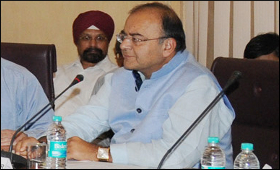|

|
2014-15 FDI up 40 percent, hopeful on GST rollout: FM
|
|

|
|
| Top Stories |
 |
|
|
|
SME Times News Bureau | 15 May, 2015
Finance Minister Arun Jaitley said on Thursday that foreign direct
investment into India in 2014-15 had risen by 40 percent over the
previous fiscal and hoped that the indirect tax reform that investors
are looking to would happen by the next April deadline for the GST
Bill.
The bill on the goods and services tax was on Tuesday sent to a select committee of the Rajya Sabha.
"I
am still hopeful, in fact very hopeful, that we will be able to achieve
this," Jaitley told reporters when asked about the GST Bill, on the
sidelines of an event here.
Calling the GST the biggest tax
reform since India's independence in 1947, he said it could add as much
as 2 percentage points to its economic growth.
It is seen as the key to facilitating industrial growth and improving the country's business climate.
By
subsuming most indirect taxes levied by the central and state
governments such as excise duty, service tax, VAT and sales tax, the
goods and services tax regime proposes to facilitate a common market
across the country, leading to economies of scale and reducing
inflation through an efficient supply chain.
The government wants to implement the new regime before April 2016.
The passage of the bill to become a law is, however, a lengthy process.
Being
a constitution amendment bill, which was passed by the Lok Sabha, it
needs to be passed by the Rajya Sabha with a two-thirds majority and
then ratified by at least 15 state legislatures before being sent for
the President's assent.
|
|
|
| |
|
|
|
|
|
|
|
|
|
|
|
|
|
|
| |
| Customs Exchange Rates |
| Currency |
Import |
Export |
US Dollar
|
₹91.35
|
89.65 |
UK Pound
|
₹125.3
|
₹121.3 |
Euro
|
₹108.5
|
₹104.85 |
| Japanese
Yen |
₹58.65 |
₹56.8 |
| As on 19 Feb, 2026 |
|
|
| Daily Poll |
 |
 |
| What is your primary "Make or Break" expectation from the Finance Minister this year? |
|
|
|
|
|
| Commented Stories |
 |
|
|
|
|
|
| |
|